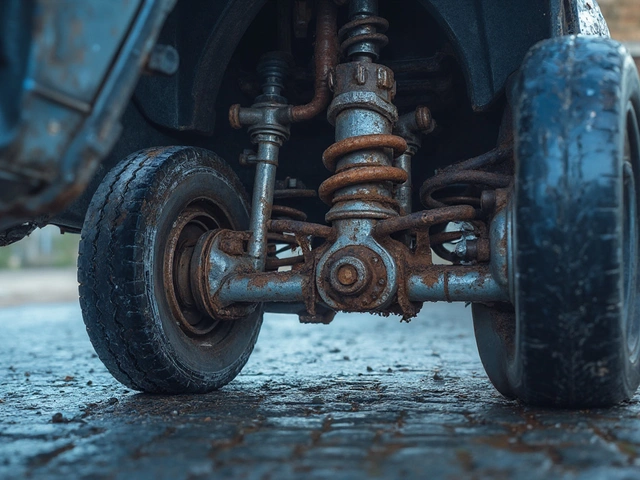Have you ever wondered why some cars have those shiny, fancy wheels that look like they belong on a racecar? Yep, those are alloy wheels, and they’re not just about showing off. First up, let’s dig into what makes these wheels stand out. Alloy wheels are typically made from an amalgam of aluminum or magnesium, which makes them lighter than the regular steel ones. This lightweight feature is not just for aesthetics; it can actually help your car perform better by improving handling and speed. Ever notice how easier it is to steer with less weight on your shoulders? It’s kind of like that, but for your car.
Now, before you think about swapping out your trusty steel wheels, it’s worth considering the other perks. Many drivers rave about the improved fuel efficiency and braking performance. Sounds like a win-win, right? But hold on, it’s not all roses and rainbows. We'll also chat about some potential downsides so you can make a choice that's as cool as those wheels you're eyeing.
- What Are Alloy Wheels?
- Benefits of Alloy Wheels
- Downsides to Consider
- Maintenance Tips for Alloy Wheels
- Final Thoughts: Are They Right for You?
What Are Alloy Wheels?
Alloy wheels are like the cool cousin of the car world. They aren't just any regular wheels. They're crafted from alloys of aluminum or magnesium, which makes them both lightweight and strong. The magic here is in the mix of metals, giving these wheels a performance edge. Because they weigh less than your standard steel wheels, they contribute to better fuel efficiency and handling. You know how a lighter suitcase is easier to carry around? Well, alloy wheels work similarly for your car.
One standout feature of alloy wheels is their ability to dissipate heat more effectively. This is especially important for those who live in areas with lots of stop-and-go traffic. Why? Because cool brakes are happy brakes. When the heat is kept under control, your brakes perform better and last longer. Using these wheels might just save you some brake repairs down the road.
Besides all that technical stuff, alloy wheels really give your car a sleek, modern look. They come in a ton of designs and finishes, meaning you can personalize your ride more than with plain old steel. This style upgrade is why so many car enthusiasts are drawn to them like bees to honey.
If you're curious about how they stack up against other wheels, here's a quick snapshot:
| Aspect | Alloy Wheels | Steel Wheels |
|---|---|---|
| Weight | Lighter | Heavier |
| Strength | Strong but can crack | Very durable |
| Heat Dissipation | Excellent | Poor |
| Design Variety | Wide variety | Limited |
Comparing these bits, it's clear why folks find alloy wheels appealing, but it also shows that there's a bit of give and take. Like choosing between your favorite desserts, there's no one-size-fits-all. Picking the right wheels depends on what you want most from them—style, performance, or maybe a little of both.
Benefits of Alloy Wheels
So, what’s all the fuss about alloy wheels anyway? Let’s break it down why so many car enthusiasts are turning to these shiny treasures. First and foremost, they’re lighter. This might not sound like a big deal, but when you’re talking about a whole set of four wheels, shaving off extra weight can really make a difference. A lighter car is generally quicker off the line, which means you can enjoy better acceleration.
Another plus is improved handling and control. With lighter wheels, your vehicle might feel more nimble, especially around those tight corners. Think of the times you’ve had to make a quick turn; a reduced weight shifting around can be your best friend.
Now, let’s chat about heat dissipation. Alloy wheels are better at getting rid of heat during braking than their steel counterparts. This can mean better braking performance, which is crucial when you need to stop on a dime.
And we can’t ignore the style factor! Let’s be real, alloy wheels look cool. They come in a variety of designs, so your car doesn’t just run better, it looks better too.
Here's a quick look at how alloy wheels can impact your driving experience:
| Feature | Benefit |
|---|---|
| Weight | Lighter, improves acceleration |
| Handling | Better control and maneuverability |
| Heat Dissipation | Improves braking performance |
| Style | Variety of designs, enhances appearance |
Considering a switch? It’s not just about the looks; these wheels can actually enhance how your vehicle performs. But remember, like with any car upgrade, it’s about what suits your driving style and priorities.

Downsides to Consider
Alright, alloy wheels might seem all glitz and glam, but they're not perfect. First up, the cost. If you've peeked at the price tags, you know they can cost a pretty penny compared to regular steel wheels. And it's not just the initial cost; replacing or repairing these wheels could also put a dent in your wallet. So, before making the leap, think about whether the benefits line up with your budget.
Now, let's talk about durability. While alloy wheels are lighter, they can also be more fragile. They're prone to bending or cracking if you hit a nasty pothole or curb. Think about the roads you drive regularly—are they smooth cruising, or more like an obstacle course?
Another thing to mull over is maintenance. Keeping those alloy wheels looking sleek isn’t entirely free of effort. You'll need to clean them more often because they show dirt and brake dust quicker than their steel counterparts. Plus, they're more vulnerable to corrosion, especially if you live in an area where roads get salted during winter.
And speaking of weather, another downside is how heat can affect them. Because alloys conduct heat more than steel, excessive heat from your brakes can sometimes lead to brake issues if not managed well.
This isn’t to scare you off, but a little knowledge can go a long way. Weighing the pros and cons can help you decide if upgrading to alloy wheels fits your vibe, lifestyle, and wallet.
Maintenance Tips for Alloy Wheels
So you've got your shiny alloy wheels, and they look fantastic, right? To keep them in top condition, a bit of regular maintenance goes a long way. You don't have to be a car guru to do it, either. Just simple steps, and you’re good to go.
First off, cleanliness is key. You want to wash your alloy wheels regularly, and not just when you’re washing the car. Accumulated brake dust – that dark, grimy stuff – can actually damage the finish over time. Using a gentle wheel cleaner and a soft brush helps keep them spick and span. A good tip is to avoid acidic cleaners, as these can be too harsh.
Another thing to check is the tire pressure, which might not seem directly related to the wheels but hear me out. Proper tire pressure reduces stress on the wheels themselves, helping them last longer. Plus, it boosts your whole car's performance. What's not to love?
Also, give them a once-over for scratches and scuffs. Minor scratches can be polished out using a cloth and appropriate polish. If you spot cracks, it might be time to get a professional to take a look.
- Weekly Wash: Rinse dirt away with water and wipe with a non-acidic cleaner.
- Tire Pressure Check: Keep tires inflated to the recommended pressure to ease stress on the wheels.
- Scratch Attention: Use a safe polish for minor scrapes; seek professional help for bigger issues.
- Winter Alert: Salt on roads can be harsh, so clean the wheels more during snowy months.
If you're a data fanatic, a survey showed that regular cleaning can extend the lifespan of alloy wheels by up to 25%. It’s honestly worth it for the shine alone. Happy driving and keep those wheels gleaming!

Final Thoughts: Are They Right for You?
Alright, so we've gone through the benefits and drawbacks of alloy wheels. The big question now: are they the right fit for you and your car? Let’s take a more personal approach to figure this out.
If you’re someone who cares about your car's aesthetic and performance, then alloy wheels are definitely worth considering. They give your vehicle a sleek look and improve overall handling. Plus, who doesn’t love a bit of that extra fuel efficiency? On the flip side, consider your driving habits and the roads you frequent. If you’re often driving on rough surfaces, you might want to think twice, as alloy wheels can be more prone to damage.
James Mitchell, an automotive design expert, says, "Alloy wheels are like a pair of good shoes; they can really lift the look and feel, but watch out if you’re walking on gravel."
To get the best out of your investment, always remember regular maintenance. Check for cracks and clean them often to keep their shine. If budget is an issue, prioritize what matters most to you—performance, style, or budget? Maybe start with alloy wheels for aesthetics and slowly incorporate other performance parts as finances allow.
Here’s a quick checklist to help you decide:
- Are you keen on improving your car’s appearance?
- Does better handling and performance excite you?
- Is your budget ready for potential repairs or replacements?
- Are you prepared for regular maintenance?
In the end, it boils down to personal preference and needs. If you're ready to embrace the benefits along with the responsibilities, alloy wheels could be the perfect upgrade for your ride.




